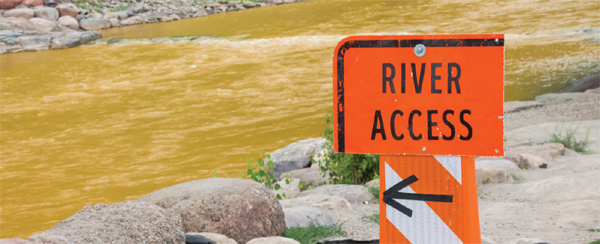January/February 2016
NSPE Today: Policy Perspectives
Mine Incident Highlights Need for Licensure of Federal Engineers
BY ARIELLE EISER

As many of you may already know, on August 5 a federal work crew from the Environmental Protection Agency caused a blowout at the abandoned Gold King Mine in Colorado, spilling more than three million gallons of untreated wastewater into the Animas River. In the aftermath of the spill, NSPE has called upon the EPA and all federal agencies to reexamine their standards and requirements for the practice of engineering on all federal projects.
This tragic incident has cast a spotlight on an issue that PEs have long been strongly advocating for: the need to require a licensed professional engineer to be in responsible charge of all engineering projects. Unfortunately, federal statute can exempt federal employees from state engineering licensure laws. In a November 9 letter to EPA Administrator Gina McCarthy and Secretary of the Interior Sally Jewell, NSPE President Tim Austin, P.E., F.NSPE, urged the agency leaders to work with NSPE to “establish standards and best practices so that, in moving forward, we can work to ensure that the proper engineering expertise, which can best be provided by licensed professional engineers, is applied to all federal projects.”
NSPE has been working closely on this issue with Rep. Bruce Westerman, P.E., (R-AR), an NSPE member, as well as congressional committees charged with oversight of the Gold King Mine blowout. At a joint hearing of the House Committee on Natural Resources and the House Committee on Oversight and Government Reform, Westerman asked McCarthy why a licensed professional engineer was not in responsible charge of the EPA’s project at Gold King Mine, as required under Colorado statute. McCarthy declined to answer, but even she was surprised at how few qualified design professionals are employed by the EPA in the affected Region 8. Following this exchange, Westerman filed an official complaint with the Colorado licensing board, stating in his press release that he believed the EPA work crew had been involved in the “practice of engineering” as defined by Colorado law and were not competent or licensed to practice engineering.
“Because the EPA has not demonstrated a Colorado licensed professional engineer was engaged during the planning and design stages nor part of the site removal team that was responsible for the Gold King Mine spill, the EPA was in direct violation of the Colorado statute, and should be subject to the same consequences any other entity in violation of this law would face.”
After the Gold King Mine blowout, the EPA requested technical assistance from the Department of the Interior and the Army Corps of Engineers to perform an independent review of the sudden release from the mine and determine steps that could be taken to prevent similar incidents at other sites. The Department of the Interior turned to the Bureau of Reclamation to lead the technical evaluation and coordinated with the Corps of Engineers and the US Geological Survey for peer review of the work performed by the Bureau of Reclamation. The evaluation team included six engineers, four of them licensed professional engineers.
The findings, published in a bureau report, revealed that the blowout could have been prevented with the proper engineering expertise. However, federal standards of practice for reopening and remediating flooded inactive and abandoned mines are inconsistent from one agency to another. Various guidelines exist for this type of work, but there are few written requirements that government agencies must follow when reopening an abandoned mine. Furthermore, mine guidelines and manuals provide detailed guidance on environmental sampling, waste characterization, and water treatment, with little appreciation for the engineering complexity of some abandoned mine projects that often require, but do not receive, a significant level of expertise.
NSPE has long urged the Environmental Protection Agency and all federal agencies to require a licensed PE, with the necessary education, experience, and qualifications, to perform all work that is the practice of engineering. The bureau report, written by an agency of the federal government, makes the strongest case possible for requiring this practice across the federal government. NSPE will continue working closely with Congress and federal agencies to address the need for licensure of engineers working on federal projects.
To learn more about NSPE’s latest advocacy news, including updates on regulations, legislation, and state action, please visit the Issues and Advocacy webpage at www.nspe.org/resources/issues-and-advocacy/latest-news.
Arielle Eiser is NSPE’s senior government relations manager.


